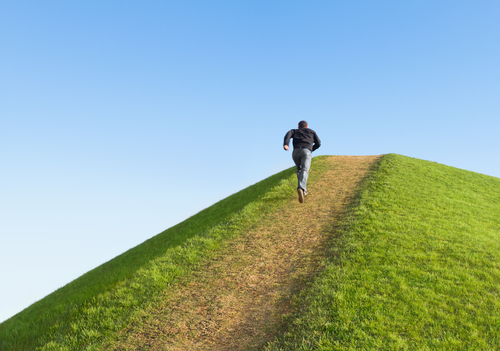I admitted I am powerless over lust and that my life has become unmanageable. (Step 1, Sexaholics Anonymous.)
Years ago I worked this step as a married man, desperate to save my relationship with my wife. This time I worked this step as a divorced man, ready to admit I have no control over lust and that my choices have led to a life I cannot manage on my own. Feels very different this time. I feel that I’m owning it more.
The last time I worked this step I had the guidance of a good man serving me as my sponsor. I’m working with a different sponsor this time, and his guidance has proven just as indispensable.
I’ve tried working these steps on my own without a sponsor. Every time I’ve failed. The only times I’ve felt real recovery and enjoyed real sobriety is when working closely with someone who’s successfully worked the steps and is still working them daily. I don’t believe there is any other way to do this. Not for me, anyway.
It makes sense, I think, that I would need a guide. By working the Twelve Steps I admit I am powerless, that my life has become unmanageable, and that I am practicing insanity to some degree (Step 2: “came to believe that a Power greater than myself could restore me to sanity”). I used to believe Jesus could be my guide. Certainly He can and I do ask Him to guide me. Now I believe that He often guides and helps me through other people.
For Step 1 my sponsor invited me to make a list, an autobiography of sorts, to document every thing and every way in which my addiction has made my life unmanageable. The purpose is to help me work Step 1 in my heart as well as in my head.
It was effective! I wrote down everything I could remember—every attempt to abstain and every relapse that followed (or at least the periods of time in which that cycle perpetuated given I cannot recall the thousands of individual attempts and relapses). I wrote down every relationship my addiction killed or damaged, every person I harmed with my selfish behavior. I noted my progress and and my failures over the years. Escalations in pornography content and new behaviors that evolved when the old ones no longer provided the same high.
Writing and reflecting made me sad to see how much time and effort I’ve spent trying to manage my life as an addict. I’ve learned a lot to be sure, but I’m still addicted. I’m still stuck in this. Clearly I cannot do this on my own. I am literally powerless over lust.
I write that last sentence and immediately recognize how foreign a concept it must be to those who have never been an addict or loved one up close. It made no sense to me for years and I’m still learning what it means (obviously, given I’m on Step 1). “Why don’t you just stop? If you wanted xyz enough, you would just stop.” I remember thinking those words to myself many times. The solution can be that simple when addiction isn’t the problem. There are myriad self-help books for changing behavior and habits. I’ve read dozens of them, all very helpful. I’ve also read a handful of books on addiction and I am telling you they are not the same beast! Telling or expecting an addict to “just stop” is as helpful as telling or expecting a sick person to just stop feeling nauseated. I have to remind myself this often, because I still speak unproductive words to myself from time to time.
I need spiritual healing, yes. But studying scripture, praying, repenting for a relapse, and confessing to my bishop is not enough.
I need physical health, true. But exercising, eating healthy, and having a healthy sex life with my spouse is not enough (also, the latter being an option I’m no longer willing to include in my life now that I’m divorced).
I need emotional intelligence and mental health, absolutely. But meditating, therapy, communicating, learning to cope healthily with life’s challenges aren’t enough.
I need to recover myself from an addiction. It’s literally an enslavement. I’m learning that my recovery requires a very specific, well-defined, and proven program fueled by connection to God and fellow addicts seeking recovery. So far I’ve found more success in working these twelve steps than I have found in any other idea or program, and I’ve tried many.
Reading my Step 1 to my sponsor today felt good. We talked about my history after I finished reading it. He shared his experience in working his Step 1. Felt good to feel understood. When he left I felt a burden lifted, but different from what I feel after confessing sin to my bishop. This wasn’t a confession but a shared understanding. He knows exactly what I’ve done and what I’m doing now because he’s done it too. I know he knows it, and he knows that I know. There’s power in that, which cannot be overstated and which I am struggling to describe.
Now I’m working Step 2. I still have a gnawing fear that the twelve steps won’t work for me. But I’m choosing to believe it can.
Moving forward!
Writing this blog helps me reaffirm what I’m learning, so thank you for reading.





